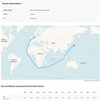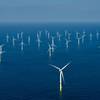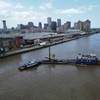The Marine Environment Protection Committee (MEPC) of the International Maritime Organization (IMO) will consider current options to reduce air pollution from ships, when it meets for its 56th session from 9 to 13 July, at the Horticultural Halls, London.
Mr. Michel Jarraud, Secretary-General of the World Meteorological Organization (WMO) is scheduled to address the opening session (at 0930 on Monday 9 July) of the Committee, on the invitation of IMO Secretary-General Mr. Efthimios E. Mitropoulos.
The Committee has a packed agenda, which also includes the further consideration of options to reduce air pollution from ships; the current draft of a proposed ship recycling convention; issues relating to the implementation of the 2004 Ballast Water Management Convention; and the proposed adoption of a number of amendments to the MARPOL Convention.
Prevention of air pollution from ships
The MEPC is expected to establish a working group to consider issues relating to the prevention of air pollution, including emission of greenhouse gases from ships.
The working group is expected to continue work on reviewing MARPOL Annex VI and the NOx Technical Code, following the April 2007 session of the Sub-Committee on Bulk Liquids and Gases (BLG), which developed a number of options for revising the regulations in relation to the emissions of NOx, SOx, volatile organic compounds and particulate matter. The aim is to finalize and approve the draft amendments to MARPOL Annex VI at MEPC 57 (Spring 2008), and to adopt the amendments at MEPC 58 (Autumn 2008) in accordance with an agreed timetable.
The Working Group will also consider issues relating to the reduction of the emission of greenhouse gases from ships, in line with a work plan agreed previously. At this session, the aim will be to follow up on the outcome of trials conducted by Member States of the CO2 Emission Indexing Scheme; consider methodology for CO2 emission baseline(s) in terms of efficiency; and consider technical, operational and market-based methods for dealing with greenhouse gas emissions.
The MEPC will also be invited to endorse a proposal by Secretary-General Mitropoulos for the conduct of a comprehensive study - by an informal cross government/industry scientific group of experts, with specific terms of reference - to review the impact on the environment, on human health and on the shipping and petroleum industries, of applying the fuel options identified as possible amendments to MARPOL Annex VI, to introduce measures aiming at reducing emissions from ships into the atmosphere.
Recycling of ships
The MEPC is expected to consider further the draft text of a new convention providing globally applicable ship recycling regulations for international shipping and for recycling activities. The aim is to complete the draft convention in time for its final consideration and adoption by a diplomatic conference in the 2008-2009 biennium.
The Committee will consider the report of the second session of the intersessional Working Group on Ship Recycling, which met from 7 to 11 May 2007, following work done by a correspondence group. The former has further developed the draft convention, along with associated draft guidelines. The new convention will provide regulations for:
* the design, construction, operation and preparation of ships so as to facilitate safe and environmentally sound recycling, without compromising the safety and operational efficiency of ships;
* the operation of ship recycling facilities in a safe and environmentally sound manner; and
* the establishment of an appropriate enforcement mechanism for ship recycling, incorporating certification and reporting requirements.
The MEPC is also expected to decide on the need for a further (third) session of the Joint ILO/IMO/BC (Basel Convention) Working Group on Ship Scrapping in 2007.
Adoption of amendments to MARPOL
The MEPC will be invited to consider, for adoption, the following amendments to the MARPOL Convention.
* Amendments to MARPOL Annex I (Regulations for the prevention of pollution by oil from ships) to include in regulation 38.2.5, on Reception facilities outside Special Areas, mention of the obligation to provide facilities in respect of oily mixtures from cargo areas of oil tankers, by including a reference to regulation 34 on discharge requirements from those cargo areas.
* Amendments to MARPOL Annex IV (Regulations for the prevention of pollution by sewage from ships) to include in regulation 11.1.1, on the requirements for discharge of sewage into the sea, the phrase "or sewage originating from spaces containing living animals". The amendment makes clear that animal effluent shall be discharged into the sea, not instantaneously, but at a moderate rate, as is currently the requirement for the discharge of untreated sewage from holding tanks.
Amendments to the IBC Code
The Committee will consider the adoption of amendments to the International Code for the Construction and Equipment of Ships Carrying Dangerous Chemicals in Bulk (IBC Code), relating to chapter 11 (fire protection and fire extinction), and the revised chapters 17 (Summary of minimum requirements), 18 (List of products to which the code does not apply) and 19 (Index of Products Carried in Bulk). The amendments were adopted by the Maritime Safety Committee (MSC) at its 82nd session in December 2006. Both the SOLAS and the MARPOL conventions make the IBC Code mandatory, so amendments to the IBC Code are required to be adopted by the MEPC and the MSC.
Amendments to the Intervention Protocol
The MEPC will also be invited to adopt amendments to the Protocol relating to Intervention on the High Seas in Cases of Pollution by Substances other than Oil, 1973 relating to the revised list of substances, to take account of the revised MARPOL Annex II classification of substances.
Harmful aquatic organisms in ballast water
Since the last session of the MEPC, four more States (Barbados, Egypt, Kiribati and Norway) have ratified the International Convention for the Control and Management of Ships' Ballast Water and Sediments (BWM Convention), adopted in February 2004, bringing the total number of contracting Governments to 10 (the other six are Maldives, Nigeria, Saint Kitts and Nevis, Spain, Syrian Arab Republic and Tuvalu), representing 3.42 per cent of the world merchant fleet's gross shipping tonnage.
Bearing in mind the emphasis the international community places on the issue of invasive species in ships' ballast water, the Committee is expected to urge other States to ratify the Convention at the earliest opportunity.
The MEPC is expected to consider, for adoption, the following guidelines which are part of a series developed to assist in the implementation of BWM Convention:
* Guidelines for additional measures regarding ballast water management including emergency situations (G13); and
* Guidelines for risk assessment under regulation A-4 of the BWM Convention (G7).
A set of guidelines for ballast water exchange in the Antarctic Treaty area will also be considered for adoption at this session. This would raise the number of Guidelines adopted in connection with the BWM Convention to fourteen.
The MEPC is expected to decide on three proposals for "basic approval" and one proposal for "final approval" of ballast water management systems that make use of Active Substances, after consideration of the report of the third meeting of the GESAMP Ballast Water Working Group, which met in February 2007.
The Ballast Water Review Group is expected to reconvene at this session to evaluate the latest information on ballast water treatment technologies and to determine whether appropriate technologies are available to achieve the ballast water performance standard required under regulation D-2 of the BWM Convention.
Further discussions are also anticipated regarding the "Methodology for information gathering and the conduct of work developed by the GESAMP-Ballast Water Working Group, as the Group requested clear guidance from MEPC 56 on a number of aspects identified in the report of its third meeting in February 2007.
Subscribe for
Maritime Reporter E-News
Maritime Reporter E-News is the maritime industry's largest circulation and most authoritative ENews Service, delivered to your Email five times per week










